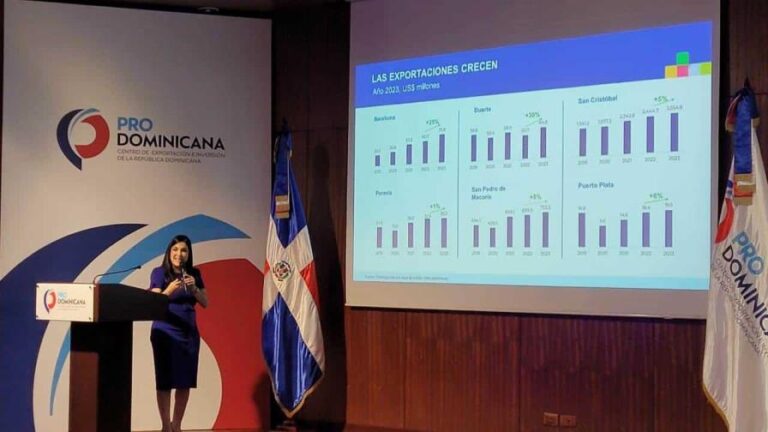El Banco Central de la República Dominicana (BCRD) informó que el índice de precios al consumidor (IPC) registró un incremento de 0.20% en diciembre pasado respecto al mes de noviembre anterior, con cuyo resultado la inflación del año 2019 cerró en 3.66%, un nivel por debajo del punto central del rango meta establecido en el Programa Monetario de 4.0% (± 1.0%).
En el informe acerca del comportamient5o de los precios al consumidor durante el último mes del 2019, el BCRD dijo que en cuanto a la inflación subyacente anualizada, la misma fue de 2.25%. Este indicador estima las presiones inflacionarias de origen monetario, aislando los efectos de factores exógenos (como el impacto del alza del petróleo y sus derivados), al excluir del IPC general algunos bienes agropecuarios cuyos precios tienden a ser volátiles, las bebidas alcohólicas, el tabaco, los combustibles y los servicios administrados y de transporte. La segregación permite extraer señales más claras para la conducción de la política monetaria.
Mayores impactados
El BCRD señala que los grupos de mayor variación relativa en la inflación del año 2019 fueron Alimentos y Bebidas No Alcohólicas (7.13%) y Bebidas Alcohólicas y Tabaco (7.26%), los cuales representaron el 59.08% del aumento del índice general en el referido período. Asimismo, en este resultado incidió el crecimiento anual de los índices de precios correspondientes a los grupos Educación (4.57%), Salud (3.65%), Bienes y servicios diversos (3.51%), Transporte (3.16%), entre otros.
El análisis del índice general para el mes de diciembre arroja que los grupos de mayor incidencia fueron Transporte (0.38%) y Vivienda (0.49%), explicando en conjunto el 56.5% de la inflación del último mes del año 2019. En sentido contrario, el grupo Alimentos y Bebidas No Alcohólicas registró una variación de -0.20%, contribuyendo a que el resultado del IPC general no fuese mayor.
El informe del BCRD expone que la inflación del grupo Transporte en el mes de diciembre fue de 0.38%, debido principalmente a los aumentos de precio de los pasajes aéreos (15.76%). En menor medida incidieron las alzas en los precios del gas licuado de petróleo (GLP) para vehículos (1.93%), la gasolina prémium (0.07%) y el gasoil (0.27%), como resultado de los ajustes semanales dispuestos por el Ministerio de Industria, Comercio y Mipymes, y por las alzas registradas en los pasajes en motoconcho (0.92%) y el servicio de reparación de vehículos (0.62%).
Grupos alimentos y bebidas bajó 0.20%
El IPC del grupo Alimentos y Bebidas No Alcohólicas, que es el de mayor ponderación dentro de la canasta familiar, arrojó una variación de -0.20%, sustentada por las disminuciones en los precios de guandules verdes (-17.39%), ajíes (-17.37%), ajo (-4.68%), lechuga (-17.88%), yuca (-1.89%), cebollas (-1.93%), naranjas (-2.53%), ñame (-5.76%), zanahoria (-11.92%), verduras (-3.13%), batatas (-8.13%) y huevos (-0.79%).
Fuente: El Caribe[:en]
The Dominican Central Bank (BCRD) reported that the consumer price index (CPI) registered an increase of 0.20% last December compared to, resulting in inflation closing at 3.66% in 2019, a level below the central point of the target range of 4.0% (± 1.0%) established in the Monetary Program.
In the report on consumer price performance during the last month of 2019, the BCRD said that in terms of annualized core inflation, it was 2.25%. This indicator estimates inflationary pressures of monetary origin, isolating the effects of outside factors (such as the impact of the rise in oil and its derivatives), by excluding some agricultural goods from the general CPI whose prices tend to be volatile, and alcoholic beverages, tobacco, fuels and administration and transport services. Segregating leads to clearer signals for the performance of monetary policy.
Most affected
The BCRD notes that the groups with the highest relative variation in inflation in 2019 were Food and Non-Alcoholic Beverages (7.13%) and Alcoholic Beverages and Tobacco (7.26%), which accounted for 59.08% of the increase in the general index in the referred period. Likewise, the annual growth of the price indices corresponding to the Education (4.57%), Health (3.65%), Miscellaneous goods and services (3.51%), Transportation (3.16%) groups, among others, also affected this result.
The analysis of the general index for the month of December shows that the groups with the highest incidence were Transportation (0.38%) and Housing (0.49%), together accounting for 56.5% of the inflation in December 2019. On the other hand, the Food and Non-Alcoholic Beverages group registered a variation of -0.20%, preventing the general CPI result from being greater.
The BCRD report states that the inflation of the Transportation group in the month of December was 0.38%, mainly due to increases in the price of air tickets (15.76%). To a lesser extent, there were increases in the prices of liquefied petroleum gas (LPG) for vehicles (1.93%), premium gasoline (0.07%) and diesel oil (0.27%), as a result of the weekly adjustments provided by the Ministry of Industry, Commerce and MSMEs, and for the increases registered in motor-taxi rates (0.92%) and vehicle repair service (0.62%).
Food and beverage groups fell 0.20%
The CPI of the Food and Non-Alcoholic Beverages group, which weighs the most within the family weekly shop, showed a variation of -0.20%, supported by decreases in the prices of green pigeon peas (-17.39%), peppers (-17.37 %), garlic (-4.68%), lettuce (-17.88%), cassava (-1.89%), onions (-1.93%), oranges (-2.53%), yams (-5.76%), carrots (-11.92% ), vegetables (-3.13%), sweet potatoes (-8.13%) and eggs (-0.79%).
Source: El Caribe[:]




